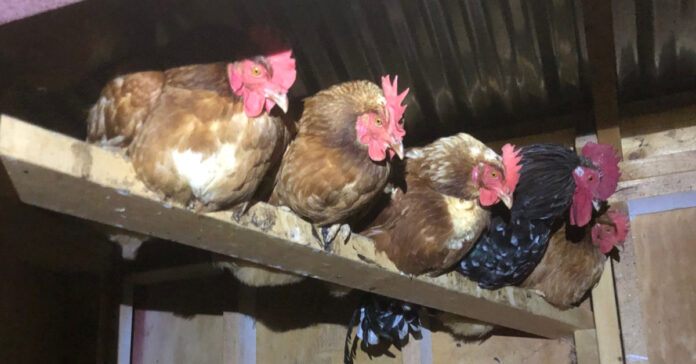
This morning, after I let the chickens out of their run, I sat and watched them peck and scratch in our fenced-in area for about 20 minutes. I have to be there to keep them out of the Swiss Chard. For some reason, two of the hens like to jump up onto the raised beds and peck at the Swiss Chard, which annoys my wife. She prefers her Swiss Chard un-pecked. (They ignore the squash plants, but they will eat the zucchini and yellow squash if we cut them up and toss them into their run.)
Taking care of the chickens is easy. Once a day, I go to the chicken run to toss out their old water and replace it with fresh. Then I open the coop and add two large scoops of feed to their feeder. When their grit gets low, I refill it. Most days, I let the chickens free range while I am there to keep hawks at bay, but if I am in a hurry, I skip the free ranging and they have to run about their pen. When they free range, shaking the cup of chicken scratch and calling them sends them running back to me.
I gather the eggs late morning or early afternoon. After dark, when I am walking the dog, I walk by the coop and make sure the door has closed. That’s about all there is to it. Feed, water, harvest, make sure they are safe at night. If I’m in a hurry, I can do it all in 15 minutes a day.
Low Cost Livestock
Once you build or buy the coop ad put up the fence, raising chickens is low cost. Including the cost of bedding, food, scratch, and grit, and I spend less than $50 a month to keep 13 egg-layers. That works out to producing eggs for $1.65 per dozen. I sell three or four dozen a week at $5 per dozen. (Less in the winter, more in the summer when the hens lay more.)
I built our coop from scratch, but the fast and easy way would be to buy a small shed from a big box store or one of those roadside shed companies. I like the shed idea far more than pre-built chicken coops, which are usually too small. With a shed, you can add roosts and stand up inside to clean it out.
We’re going to be getting 8 more chicks in April 2023. I have all the equipment for keeping chicks, so raising them will not add any cost over the $3.50 per chick. They should start laying this time next year. Compare that to the cost of a cow or even a goat. There are many reasons chickens are an ideal starter livestock, and cost is a big one.
What’s Stopping You?
There’s really no excuse not to have chickens, unless you live in an apartment, townhouse, or somewhere they are prohibited. I strongly believe you should have chickens if you have a backyard. Just check your local laws and HOA regulations. Most allow a limited number of hens but no roosters. Go for it, and you’ll have fun and fresh eggs.
I recommend three hens per person, so a couple who had six hens from a strong laying breed can expect 120 dozen eggs per year. That’s more than two dozen per week, enough to eat fresh eggs most mornings and still have some to use in recipes. If you build up a surplus, almost no one says no to free eggs and many people will buy them from you.
Roosters are loud, and they can be aggressive, but they also protect the flock from predators. I only have a rooster because I want the option of producing my own chicks in a survival situation, but I’d have hens even if we didn’t have a rooster.
Advantages
Our flock’s biggest value to me is as a food source, should times get tough. After selling a couple dozen eggs per week, we’re getting our own eggs for free. So the economy of raising our own eggs is also a nice, and somewhat unexpected, benefit.
As I write this, factory-farm eggs are $3.99 a dozen and up. A #10 can of Augason Farms dried whole egg powder is selling on Amazon for $108.64. It contains about 72 eggs, or six dozen, so it breaks down to about $18 per dozen.
Besides eggs, our chickens produce valuable garden inputs via their used bedding and their manure. This gets added to the compost pile or the garden beds. Gardeners consider chicken manure “hot” so you should let it compost before you apply it to live plants.
If you have a problem with ticks, stink bugs or other insects, chickens will gobble them up, reducing local numbers. Of course, they’ll eat beneficial insects as well. They are not picky.
If you have kids, chickens are not only great entertainment, but they can be educational and used to teach responsibility and the facts of life.
Disadvantages
Owning chickens is not ideal if you travel a great deal. While you can automate feeding and watering, if you leave home for a few days, you probably will want someone to come over and check on the chickens in your absence. I am comfortable leaving ours overnight, but no longer.
Some people might lead you to believe chickens smell bad. Ours don’t, but once in a while, the coop does when you open it. That tells me it’s time for some new bedding. If your neighbor’s chickens stink, they either have too many birds for the space or the bedding needs to be changed and the coop cleaned.
Our biggest challenge is how to dispose of dead chickens or live birds who are no longer producing. One of our friends hangs on to their old birds even after they stop laying eggs. That’s OK, but it can get expensive, and each non-productive bird is taking up room that could be used by a bird that lays six or seven days a week. We consider our chickens livestock, not pets. We treat them well, but when their useful lives come to an end, they don’t get a retirement plan.
Chickens will strip their run or any small or confined area of everything green. That’s one reason we don’t let them free range more than an hour a day. If you have a large area in which they can free range, , this will be less of a problem.
Self Sufficiency
Will chickens make you self-sufficient? No, but chickens are a step towards reducing our dependency on big food. Our chickens are also a useful way to diversify our preps, because powdered eggs will run out.
Achieving complete self-sufficiency is extremely difficult unless you are fabulously wealthy or dramatically lower your standards and live like a mountain man in the early 1800s. (And even they had to buy powder and lead as well as beans, cornmeal and four.) But every step you can take gets you closer. But nothing is stopping you from making steps. Chickens are a good step.
What are you waiting for? Plan now and you can have chicks peeping at you by April and fresh eggs by September.






